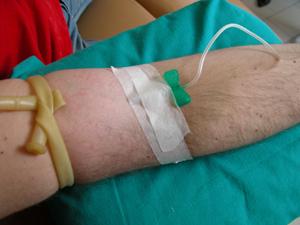
If you're having lab work done soon, you may have heard about fasting before your blood test. This article explains the importance of fasting in order to ensure correct results during blood work.
Eight Blood Test Fasting Tips
If a doctor requests that you fast prior to giving blood for testing purposes, he or she probably has good reason. Some tests may be skewed or can show false results if you have not been fasting for an appropriate amount of time. Here are a few tips to follow when fasting.
- Fasting should be used only for short-term use, under the advice of a doctor, and not for weight-loss.
- Follow your doctor's advice for the duration of the fast. Depending on the type of tests ordered, fasting before blood tests can last only a couple of hours up to an entire day.
- Before beginning your fast, be sure to eat a nutritious, balanced diet full of lean proteins, fruits, vegetables, and plenty of whole grains. This can help to stave off hunger and energy loss during the fast.
- Drink plenty of water while fasting. Worse than experiencing fasting hunger is being dehydrated. Be sure to consult your doctor to find out if you should stop drinking a few hours prior to blood work. Sometimes, this is also required.
- Avoid drinking anything other than water for the duration of the fast. Orange juice, coffee, teas, and sodas can adversely affect the results of a blood test.
- If you are fasting for 24 hours, use caution when driving or operating machinery. It's possible you may experience lightheadedness or dizziness.
- It's probably not a good idea to exercise or spend a lot of time outside in the heat when you are fasting before blood tests. Some individuals experience drops in blood sugar and may feel faint. Additionally, if you're being tested for glucose, exercise can affect the result.
- Avoid gum and vitamin and mineral supplements. These things can sometimes have a similar affect as food on the test results.
Blood Tests That Require Fasting
There are many different types of tests that require fasting. The amount of fasting time varies from test to test and will be prescribed by your doctor.Fasting is sometimes required for the following tests:
- Iron-deficiency Anemia
- Blood Sugar
- Cholesterol
- Sexually Transmitted Diseases
- Basic Metabolic Panel (BMP)
- Comprehensive Metabolic Panel (CMP)
The Importance of Accurate Results
If you do not properly fast before your tests, your results can be skewed. The negative consequences to this can include getting a faulty diagnosis, being prescribed medications in the wrong dosage or that you may not need at all, or not getting medications you do need. For these reasons, it's crucial to follow all directions prescribed by your physician when it comes to your blood tests and fasting.
Follow Written Instructions
Federal law requires all patients undergoing tests which require fasting preparation to receive written instructions on how to correctly fast. If your doctor does not give you these directions, it's important you ask for them, even if you've done the procedure before. Occasionally, these instructions may change or the duration of your fast may change. Written instructions are provided to prevent any confusion on your part and error on theirs. While fasting can be uncomfortable, if you follow all directions, it can be only a small, necessary speed bump on the road to good health.







